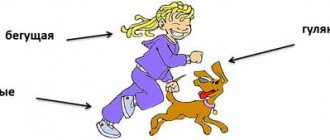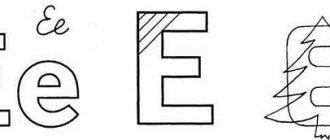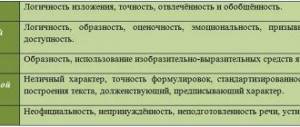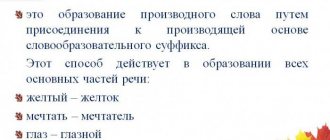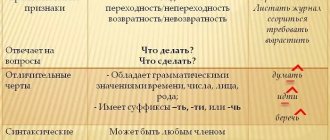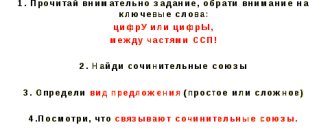Verb conjugation in Russian. Basic Rules
Good afternoon, dear student! Today we will talk about one of the most complex types of parts of speech in the Russian language - the verb. It is not surprising that foreigners always have difficulties when learning this part of speech, because even Russian-speaking people very often make mistakes. So what is conjugation? Conjugation is a change in the form of a verb in persons and numbers. There are only 2 types of conjugation in the Russian language: 1st and 2nd, but there are quite a lot of exceptions that need to be remembered. Person in Russian is a verb category that indicates who performs the action. As far as we know from previous articles, there are 3 persons in the Russian language: 1- the pronouns I, we. The 2nd person refers to - you, you. The 3rd includes - he, she, it, they.
To understand which conjugation a particular verb belongs to, we need to know that stress plays an important role here. The fact is that conjugation is determined by the endings and suffixes of the verb.
1. According to the stressed personal endings of present tense verbs. 2. If the ending of the verb is unstressed, the conjugation is determined by suffixes of the indefinite form. Let's look at how to determine the conjugation by personal endings; the highlighted letters are under stress:
1 conjugation
| Face | Ends Units h. | Mn endings Ch. | Example |
| 1 | -у/у | -eat | Rice u /Rast e m |
| 2 | -eat | -yeah | Eat rice /Grow it up |
| 3 | -et | -ut/ut | Rice yut / Rice yut |
2 conjugation
| Face | Ends Units h. | Mn endings Ch. | Example |
| 1 | -у/у | -them | Purchase y /K y pim |
| 2 | - look | -ite | Prepare about you/K at pita |
| 3 | - it | -at/yat | It irritates the heels _ |
If our endings are unstressed, then in order to determine the conjugation of the verb, we need to turn to the indefinite form and determine the desired conjugation using the suffix.
But in the Russian language there are many exceptions, which I wrote about above. Verbs of 1st conjugation are represented by the following suffixes:
- verbs in the indefinite form with the suffix -et, except for 7 exception verbs: see, offend, hate, depend, endure, watch, twirl
. - verbs that have the suffix -at in an indefinite form, except for exception verbs: breathe, drive, hear and hold
. - three verbs with the suffix - it: to build (to be based on something), to lay and to shave
. - all verbs with suffixes: -ot, -ut, -t: shoe, weed, grind.
Verbs 2 conjugations:
- all verbs with the suffix - it
, except for 3 verbs that were described in 1 conjugation. - seven verbs with the suffix - et
: which were described in 1 conjugation. - four exception verbs with the suffix - at
: described in the 1st conjugation.
However, in the Russian language there are a lot of differently conjugated verbs that can refer to both the 1st and the second conjugation, for example,
Want, honor, run, forgive
These verbs belong partially to the 1st and 2nd conjugations.
Russian language lesson 5th grade Unstressed personal endings of verbs. - presentation
Russian language lesson 5th grade Unstressed personal endings of verbs
Objectives: educational: 1. Generalization of students’ knowledge of spelling and punctuation. 2. Strengthening the ability to determine the conjugation of verbs. developing: 1. Development of logical thinking, students’ speech culture, auditory and visual memory; 2. Development of students’ oral and written speech, literary and creative abilities; 3. Development of independent work skills; educational: Fostering a value-based attitude towards the world around us, respect for the living Russian word.
Lesson objectives: Remember the spelling of the letters e and and in the personal endings of verbs; Teach how to use graphic conditions for choosing a given spelling; Strengthen the ability to determine verb conjugation. Equipment: handouts with text, table “Personal endings of verbs”, interactive board. Lesson type: lesson on improving knowledge, skills and abilities. Type of lesson: lesson - workshop
Repetition of covered material. (work in notebooks and at the board) a) make a transcription of the words: leaves, solution, clear. b) place punctuation marks in sentences, build diagrams: 1. Cold winter has come and snow covered the ground. 2. The children went outside and began sledding.
- Name all the actions that the verb performs.
Supporting notes
Verb conjugations - What is a conjugation? — Why do you need to know verb conjugation? — How to determine the conjugation of verbs?
Task: put the verbs into the indefinite form. He barks, we see, he builds, he sows, he glues.
Work in pairs: option 1 tells the rule to option 2, and option 2 to the first. Consultants record those who did not pass the scoreboard rules. (Theory)
1. Definition of conjugations. Task 1. Write down the text, determine the conjugation of verbs. (according to options) Creative group. Compose and write down a microtext of 5-6 sentences on the topic: “Winter”, using verbs 1 and 2 conjugations (reproduction of a painting by A.V. Volokitin.
Option If you get up at dawn - the roofs are in white silver. 2. You will see in the morning, the jackdaws are freezing in the wind. Option The wind petal is naked, the sun shines through the drop. 2. How easy it is to breathe on a frosty winter day.
Write down, insert the missing letters. There's already snow, there's...throwing streams, There's pav...catching...snow through the window... The snow...soon will blow, And the forest will be...dressed...with...its
Homework Creative task: Select and write down in a notebook excerpts from poems by Russian poets about winter, underline the verbs, indicate the conjugations.
What is conjugation?
Conjugation is one of the constant features of a verb. To correctly write unstressed personal endings, you need to determine the conjugation of the verb.
Definition
Changing verbs according to persons and numbers in the forms of present and future tense is called conjugation.
Verbs change according to persons and numbers in the present and future tense of the indicative mood:
- walk - I (what am I doing?) walk, you walk, he walks;
- say - I (what will I do?) I will say, you will say, he will say.
Conjugation is the change of the infinitive form of the verb, which is the initial form, into the first, second and third person singular and plural forms, for example:
verb "to purr"
- 1st person I purr - we purr
- 2nd person you purr - you purr
- 3rd person he purrs - they purr
Let’s change the verb “glorify” according to persons and numbers:
- 1st person I praise - we praise
- 2nd person you glorify - you glorify
- 3 he glorifies the person - they glorify.
